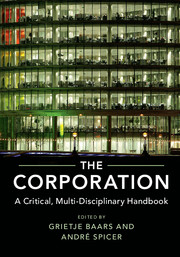Book contents
- Frontmatter
- Contents
- List of Contributors
- Acknowledgements
- Introduction: Why the Corporation?
- PART I DISCIPLINARY OVERVIEWS
- PART II INTERDISCIPLINARY THEMATIC CHAPTERS
- 1 The Evolution of the Corporate Form
- 2 The Multinational Corporate Group
- 3 The Financialization of the Corporation
- 4 Corporate Value Chains
- 5 Corporate Citizenship
- 6 The Corporation and Crime
- 7 The Corporation and Ideology
- a Bad Parresia: CSR and Corporate Mystification Today
- b Capital, Corporate Citizenship and Legitimacy: The Ideological Force of ‘Corporate Crime’ in International Law
- c Corporate Foundations and Ideology
- 8 Corporation and Communities
- 9 Corporations and Resistance
- 10 Alternatives to the Corporation
- Index
- References
b - Capital, Corporate Citizenship and Legitimacy: The Ideological Force of ‘Corporate Crime’ in International Law
from 7 - The Corporation and Ideology
Published online by Cambridge University Press: 31 March 2017
- Frontmatter
- Contents
- List of Contributors
- Acknowledgements
- Introduction: Why the Corporation?
- PART I DISCIPLINARY OVERVIEWS
- PART II INTERDISCIPLINARY THEMATIC CHAPTERS
- 1 The Evolution of the Corporate Form
- 2 The Multinational Corporate Group
- 3 The Financialization of the Corporation
- 4 Corporate Value Chains
- 5 Corporate Citizenship
- 6 The Corporation and Crime
- 7 The Corporation and Ideology
- a Bad Parresia: CSR and Corporate Mystification Today
- b Capital, Corporate Citizenship and Legitimacy: The Ideological Force of ‘Corporate Crime’ in International Law
- c Corporate Foundations and Ideology
- 8 Corporation and Communities
- 9 Corporations and Resistance
- 10 Alternatives to the Corporation
- Index
- References
Summary
Introduction
Can we imagine Shell in the dock, at the International Criminal Court? It certainly seems as if many people around the world whose health, livelihoods and environments are affected by the extractive industries, would like to see this happen. It even seems as if multinational corporations themselves (or the persons that run them) are onboard with – the idea at least – of corporate criminal liability in international law. What does this mean? Will we ever see true ‘corporate accountability’, or is corporate support for accountability mechanisms more cynical? Are multinationals using ‘corporate accountability’ in the literal sense, in order to calculate and optimize exposure to potentially risky activities and manage civil society backlash? Is support for international criminal law nothing but the deployment of ‘canned morality’ aimed at bolstering their legitimacy in an increasingly corporate-governed world, and getting angry citizens off the streets, back home onto the sofa to Netflix & chill?
One of the main responses to the corporate legitimacy backlash of the past decades has been the development of the notions of ‘corporate citizenship’ and ‘corporate social responsibility’ (CSR) and a wealth of non-binding norms on corporate behaviour culminating in UN Special Representative on Business and Human Rights John Ruggie's ‘Guiding Principles’ in 2011 (UNHCR, 2011). Frustrated by the lack of ‘teeth’ (enforceability) of these regimes – in particular when it comes to multinationals’ involvement in environmental destruction, war, displacement and other situations of grave suffering – cause lawyers, activist scholars and others have started to push for ‘corporate accountability’ through binding norms in international law. One route that is regularly debated and advocated is the creation (or, recognition and enforcement) of a norm of corporate liability in international criminal law (ICL), or what we might call ‘corporate ICL’ (CICL). This proposal rides on a trend of increasing acceptance of corporate criminal liability in domestic legal systems and massive popular support for ICL globally (Baars, 2014). A putative CICL has manifested itself in recent scholarly writing on the topic as well as in activist lawyer-led ‘weaponized CSR’ litigation and advocacy in multinationals’ home states based on claims of corporate complicity in war crimes, crimes against humanity, environmental and other crimes committed elsewhere in the world.
- Type
- Chapter
- Information
- The CorporationA Critical, Multi-Disciplinary Handbook, pp. 419 - 433Publisher: Cambridge University PressPrint publication year: 2017
References
- 2
- Cited by



